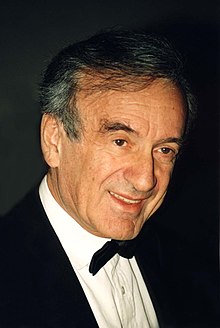
Elie Wiesel Page 2
We found 20 free papers on Elie Wiesel
Essay Examples
Overview
Night by Elie Wiesel
Elie Wiesel
Night
Statement of the Author’s Purpose The reason that Elie Wiesel writes this book is to make sure that nobody will ever forget about the terrible events that happened during the Holocaust. Elie Wiesel writes the book to tell everyone his own experiences as a Jew during the Holocaust and how it has affected him. Elie…
Elie Wiesel Critical Lens
Elie Wiesel
“I swore never to be silent whenever and wherever human beings endure suffering and humiliation. We must always take sides. Neutrality helps the oppressor, never the victim. Silence encourages the tormentor, never the tormented.” – Elie Wiesel. In a simplified manner, this quote by Elie Wiesel stresses the importance of not remaining silent in the…
Importance of Family in Novel “Night”
Elie Wiesel
Night
“Our immortality comes through our children and their children. Through our roots and branches. The family is immortality. And Hitler has destroyed not just branches and roots, but entire family trees, forests. All of them, gone.” (Amy Harmon). The holocaust was a very dreadful event that happened in history. The Holocaust occurred in 1933; it…
Autobiographic Novel “Night” by Elie Wiesel
Elie Wiesel
Night
In the book Night by Elie Wiesel, the author chronicles his own story as a holocaust survivor who endures many hardships during his time in the concentration camps. One theme that Wiesel incorporates throughout the novel is dehumanization. Kapos, SS Officers, and even Jews themselves behave in ways that dehumanize the prisoners around them. They…
The Writing Style of Elie Wiesel
Elie Wiesel
In the memoir Night, Elie Wiesel uses a distinct writing style to relate to his readers what emotions he experienced and how he changed while in the concentration camps of Buna, during the Holocaust. He uses techniques like irony, contrast, and an unrealistic way of describing what happens to accomplish this. By applying these techniques,…
Rhetorical Devices in Night by Elie Wiesel Literary Devices
Elie Wiesel
Night
In Night by Elie Wiesel, Elie experiences a dangerous journey through the Holocaust, from his hometown, through Auschwitz, to liberation. In chapter three, Elie and his village arrive to Auschwitz, where they exit the cattle cars that brought them here and now begin their perilous fight for survival. During this fight, Elie is not prepared…
Themes of Anger and Faith in Night by Elie Wiesel
Elie Wiesel
In Night, by Elie Wiesel, there is an underlying theme of anger. Anger not directed where it seems most appropriate- at the Nazis- but rather a deeper, inbred anger directed towards God. Having once been a role model of everything a “good Jew” should be, Wiesel slowly transforms into a faithless human being. He cannot…
Elie Wiesel The Book Night
Elie Wiesel
The book Night opens in the town of Signet where Elie Wiesel, the author ,was born . He lived his child hood in the Signet, Transylvania . He had threesisters Hilda, Bea, and Tzipora. His father was an honored member of the Jewishcommunity. He was a cultured man concerned about his community yet, he was…
Night – Dehumanization of the Jews Sample
Aggression
Elie Wiesel
social institutions
Social Issues
Social psychology
One of the saddest facets of the Holocaust was non how many lives were lost. but how many psyches were lost. Those lucky plenty to last Auschwitz. Buchenwald. and the similar came out changed work forces and adult females. and non for the better. While some. such as Elie Wiesel. were able to lend to…
Human Rights in Speeches of Elie Wiesel and Susan B. Anthony
Elie Wiesel
Susan B Anthony
Human rights are an issue throughout the world, causing social injustice to people of every ethnicity and gender. Our response to the violation of human rights needs to be held to the utmost importance. Two speeches that provide examples of injustice and calls for change are “The Perils of Indifference” by Elie Wiesel and “On…
| born | September 30, 1928, Sighetu Marmației, Romania |
|---|---|
| died | July 2, 2016, Manhattan, New York, NY |
| description | Elie Wiesel was a Romanian-born American writer, professor, political activist, Nobel laureate, and Holocaust survivor. He authored 57 books, written mostly in French and English, including Night, a work based on his experiences as a Jewish prisoner in the Auschwitz and Buchenwald concentration camps. |
| books | Night 1956, The Night Trilogy 1962, Day 1961 |
| education | University of Paris |
| quotations | “We must always take sides. “Sometimes we must interfere. “Friendship marks a life even more deeply than love. “No human race is superior; no religious faith is inferior. “The opposite of love is not hate, it’s indifference. “Think higher, feel deeper.”,We must take sides. Friendship marks a life even more deeply than love. Without memory, there is no culture. There may be times when we are powerless to prevent injustice, but there must never be a time when we fail to protest. |
| information | Short biography of Elie WieselElie Wiesel was born on September 30, 1928, in Sighet, Transylvania, a region now located in Romania. He was the third of four children and the only son of Shlomo and Sarah Wiesel. At home, Wiesel’s family spoke Yiddish, and he also learned Hebrew from his father, who was a ritual slaughterer, teacher, and teller of Talmudic stories. General Essay Structure for this Topic
Important informationSpouse: Marion Wiesel (m. 1969–2016) Awards: Nobel Peace Prize, National Jewish Book Award for Modern Jewish Thought & Experience Siblings: Tzipora Wiesel, Beatrice Wiesel, Hilda Wiesel |

